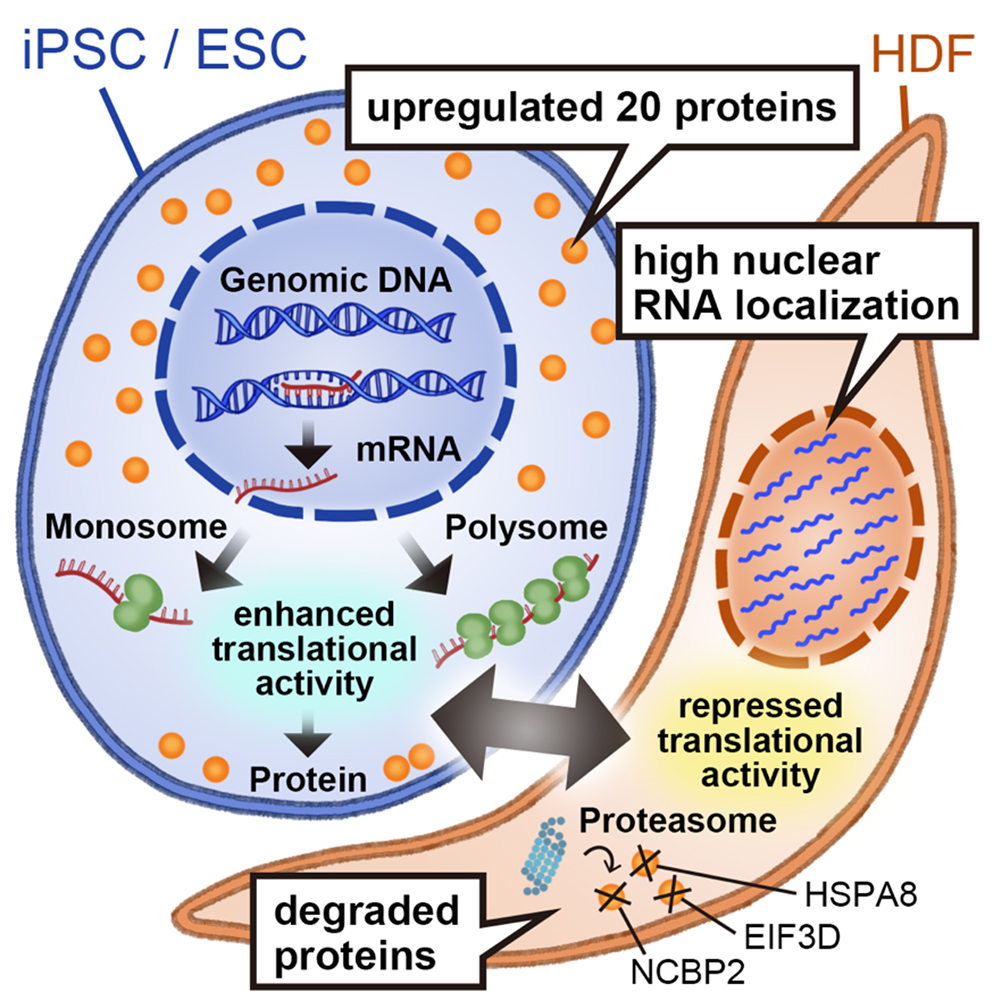
News & Events
News & Events
News
May 16, 2022
Discovery of genes required for survival of human iPS and ES cells
Points
- The post-transcriptionally regulated 20 genes are necessary for iPSC survival
- mRNA localization affects the protein amounts in most of the 20 genes
- Translation is repressed in HDFs despite mRNA binding to ribosomes
Proteins are the end products of genes made from mRNA templates, and mRNA is a molecule that acts as a copy of the blueprint for making proteins. There is a difference between the amount of mRNAs and the amount of proteins in a single cell. However, it was not well understood in what kind of cells those quantitative differences are large, and whether genes with quantitative differences have important functions for the cell.
In this study, the amounts of mRNAs and proteins were comprehensively analyzed using pluripotent stem cells such as human iPS cells and ES cells, and skin cells (human dermal fibroblasts: HDFs) from which iPS cells are derived. As a result, the researchers identified 228 genes whose mRNA levels in the cells did not change but only protein levels varied. These genes were found to be particularly variable in pluripotent stem cells.
Examining the importance of these genes, they found that 84 genes were important regardless of cell type, but 20 genes were specifically essential for the survival of pluripotent stem cells.
Furthermore, the research group investigated how the amounts of proteins in the three cell types are regulated. The researchers found that there are three gene groups whose protein degradation is enhanced in HDFs and that the subcellular localization of mRNAs varied in most of the 20 genes. These results suggest that protein levels may be regulated by mRNA localization.
This research is one step toward elucidating the regulatory mechanisms of protein amounts.
The results of this research were published in iScience on April 25, 2022.

Figure: Protein levels of 20 genes are highly regulated in iPS/ES cells and less so in skin-derived differentiated cells (HDF)
Paper Details
- Journal: iScience
- Title: Multi-omics approach reveals post-transcriptionally regulated genes are essential for human pluripotent stem cells
- Authors: Mio Iwasaki1*, Yuka Kawahara1, Chikako Okubo1, Tatsuya Yamakawa1, Michiko Nakamura1, Tsuyoshi Tabata1, Yohei Nishi1,2, Megumi Narita1, Akira Ohta1, Hirohide Saito1, Takuya Yamamoto1,3,4, Masato Nakagawa1, Shinya Yamanaka1,5,6, and Kazutoshi Takahashi1*
- Author Affiliations:
- Department of Life Science Frontiers, Center for iPS Cell Research and Application (CiRA), Kyoto University
- iPSC-Based Drug Discovery and Development Team, RIKEN Bio Resource Research Center (BRC)
- Institute for the Advanced Study of Human Biology (WPI-ASHBi)
- Medical-risk Avoidance based on iPS Cells Team, RIKEN Center for Advanced Intelligence Project (AIP)
- Gladstone Institute of Cardiovascular Disease
- Department of Anatomy, University of California






















